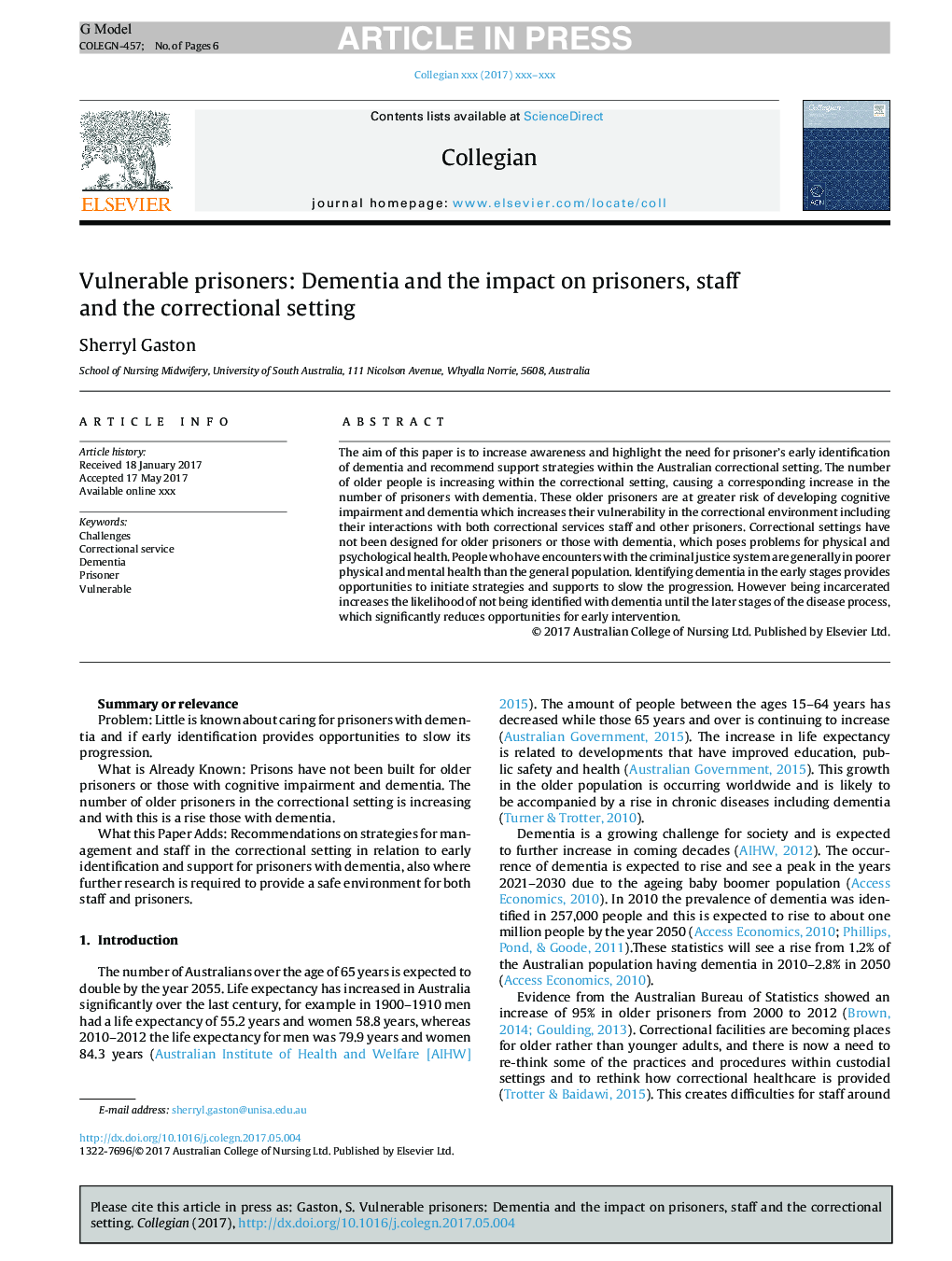| کد مقاله | کد نشریه | سال انتشار | مقاله انگلیسی | نسخه تمام متن |
|---|---|---|---|---|
| 8568620 | 1563757 | 2018 | 6 صفحه PDF | دانلود رایگان |
عنوان انگلیسی مقاله ISI
Vulnerable prisoners: Dementia and the impact on prisoners, staff and the correctional setting
ترجمه فارسی عنوان
زندانیان آسیب پذیر: دمانس و تاثیر آن بر زندانیان، کارکنان و محیط اصلاحی
دانلود مقاله + سفارش ترجمه
دانلود مقاله ISI انگلیسی
رایگان برای ایرانیان
کلمات کلیدی
چالش ها، خدمات تصحیح، کم خونی زندانی آسیب پذیر،
ترجمه چکیده
هدف از این مقاله افزایش آگاهی و تشریح نیاز به شناسایی زود هنگام زندانی در معرض دمانس است و توصیه های استراتژی حمایت در محیط اصلاحی استرالیا را توصیه می کند. تعداد افراد مسن تر در محدوده اصلاحی افزایش می یابد و باعث افزایش معادل تعداد زندانیان مبتلا به زوال عقل می شود. این زندانیان بزرگتر در معرض خطر ابتلا به اختلالات شناختی و زوال عقل هستند که آسیب پذیری آنها را در محیط اصلاحی افزایش می دهد، از جمله تعاملات آنها با کارکنان خدمات اصلاحطلب و سایر زندانیان. تنظیمات اصلاحی برای زندانیان بزرگتر یا افراد مبتلا به زوال عقل طراحی نشده است، که برای سلامتی جسمی و روانی مشکل است. افرادی که با نظام عدالت کیفری مواجه هستند عموما در معرض خطر فیزیکی و روانی فقیرتر از جمعیت عمومی هستند. شناسایی زوال عقل در مراحل اولیه فراهم می کند فرصت هایی برای ایجاد استراتژی ها و پشتیبانی برای تسریع پیشرفت. با این حال، در زندان، احتمال تاخیر در شناسایی زوال عقل تا مراحل بعدی فرآیند بیماری افزایش می یابد، که به طور قابل توجهی فرصت های مداخله زودهنگام را کاهش می دهد.
موضوعات مرتبط
علوم پزشکی و سلامت
پزشکی و دندانپزشکی
سیاست های بهداشت و سلامت عمومی
چکیده انگلیسی
The aim of this paper is to increase awareness and highlight the need for prisoner's early identification of dementia and recommend support strategies within the Australian correctional setting. The number of older people is increasing within the correctional setting, causing a corresponding increase in the number of prisoners with dementia. These older prisoners are at greater risk of developing cognitive impairment and dementia which increases their vulnerability in the correctional environment including their interactions with both correctional services staff and other prisoners. Correctional settings have not been designed for older prisoners or those with dementia, which poses problems for physical and psychological health. People who have encounters with the criminal justice system are generally in poorer physical and mental health than the general population. Identifying dementia in the early stages provides opportunities to initiate strategies and supports to slow the progression. However being incarcerated increases the likelihood of not being identified with dementia until the later stages of the disease process, which significantly reduces opportunities for early intervention.
ناشر
Database: Elsevier - ScienceDirect (ساینس دایرکت)
Journal: Collegian - Volume 25, Issue 2, April 2018, Pages 241-246
Journal: Collegian - Volume 25, Issue 2, April 2018, Pages 241-246
نویسندگان
Sherryl Gaston,
